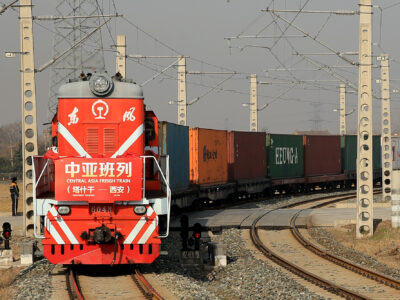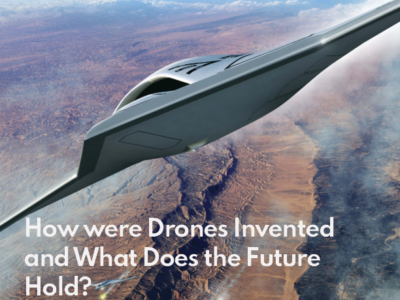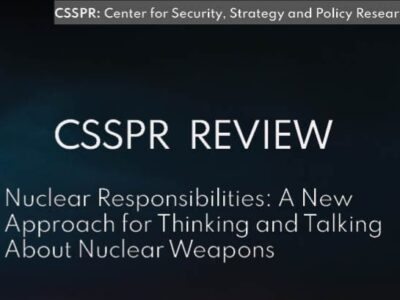Shahneela Tariq
Nuclear security threats have existed since the beginning of the First Nuclear Age. Initially, the focus was on espionage by states, but the 9/11 attacks brought the challenge of nuclear terrorism to the fore. It can be categorized as a strategic risk as it has transnational effects, especially if nuclear materials or devices are stolen or sabotaged. Therefore, states have incorporated stringent measures to deal with nuclear security threats and to provide guarantees to other states on effective security regulations. However, we are living in the era of the fourth industrial revolution where major powers are moving towards the sophistication of their nuclear weapons programs with allegedly more usable capabilities. The world is facing a similar challenge it faced decades ago with the advent of nuclear technology: the availability and allure of disruptive dual-use technologies.
It is high time to take measures on the regulation of AI technologies and encourage states to use these technologies for peaceful purposes only. IAEA defines nuclear security as the prevention of, detection of, and response to, criminal or intentional unauthorized acts involving or directed at nuclear material, other radioactive material, associated facilities, or associated activities. The responsibility to strengthen nuclear security rests with the states, but it can be taken as a shared responsibility in the age of Artificial Intelligence (AI). A broad pattern of global convergence of interest exists in nuclear security and AI technologies. It is, however, a complex task that requires persistence, competence, and enormous commitment, with a view to reducing nuclear risks. This pattern of convergence of interest can be analyzed in the context of South Asia, where both India and Pakistan are tied up in an adversarial relationship that has prevented them from taking up their nuclear responsibilities as regional powers.
This can be discussed under the Nuclear Responsibilities Framework, developed by BASIC as a part of the Programme on Nuclear Responsibilities. The Framework provides a unique approach to using alternative language in the nuclear field in order to stimulate new thinking and research that could lead to dialogues to reduce distrust and nuclear risks.
Since 1945, a nuclear device has not been used in any conflict and the deterrence theory has seemingly worked for the past several decades. However, it has created attitudes that have led to structural complacency (if nothing has happened, nothing will happen). Especially, in the backdrop of the Indo-Pak Pulwama- Balakot Crisis, the rhetoric around the self-projection of responsible nuclear weapon states was alarmingly high on both sides of the border. In the context of the rising AI phenomenon, it is important to ask these questions: Why is it important to focus on stimulating new thinking and using alternative language in the nuclear field? Why should states adopt the Security Dilemma Sensibility approach? The answer to this set of questions is this: AI technologies are the most significant and transformative dual-use technologies that are becoming critical for military and civilian use, and therefore they could have a considerable impact on the future security landscape.
It is believed that all states sooner or later would want to possess these technologies because of the value they could add to the security domain. However, these strategic non-nuclear technologies, as addressed by Prof. Andrew Futter and Prof. Benjamin Zala, have brought the global nuclear order on the cusp of the Third Nuclear Age that will rekindle major power competition in the nuclear field. This strategic shift has raised concerns over nuclear risks and how they should be addressed. China is modernizing its nuclear weapons program with AI and autonomous systems; it tested its nuclear-capable hypersonic missile in August 2021. The U.S. National Defense Strategy 2022 has noted that Artificial Intelligence, quantum science, biotechnology, and space technologies have the potential to change future warfighting and these are the very technologies the U.S. will need to win future wars. Russia is not staying behind and has released its national Security Strategy that presents its benchmarks to improve the country’s AI expertise. President Putin in a national open session said that “Artificial intelligence is the future not only of Russia but of all of mankind, and whoever becomes the leader in this sphere will become the ruler of the world”.
The desire of South Asian nuclear weapons states to acquire these technologies and capabilities cannot be denied. Both states have developed their cyber security approaches and established AI centers. However, there is no regional or international plan to deal with a crisis that could lead to doomsday. Therefore, if the international community cannot respond, it must prevent it.
The Nuclear Responsibilities Toolkit presents three levels of engagement; the first is the national level, in which stakeholders need to have an internal debate over nuclear weapons policy and planning that should lead to the assessment of nuclear responsibilities. The second is the regional level, in which constructive dialogue among states on shared nuclear responsibilities is fostered. And the last and third is the international level, in which efforts are made to help to not only reduce distrust but also strengthen international dialogues in a more cooperative environment.
India and Pakistan are continuously working to augment their national nuclear security infrastructures. According to the 2020 NTI Nuclear Security Index, Pakistan is the most improved nation in terms of nuclear security regulations. However, the frequent incidents of uranium theft in India and the accidental launch of BrahMos missile from the Indian side, are a matter of serious concern for regional security. It is therefore important for both states to have clear crisis communication and engage bilaterally on issues that are of mutual concern like nuclear security. Currently, the lines of communication are not active between India and Pakistan after the revocation of the special status of Kashmir by India in August 2019. Therefore, it is important for the international community to engage in a multilevel dialogue with South Asian nuclear states on the issues of nuclear security.
There are several pathways to ensuring nuclear security, but at the regional level, it is crucial to recreate images of a state’s responsibilities as the images we have created in South Asia are not conducive for bilateral engagement. We are constantly busy in recrimination and severely lack trust in each other due to the traditional rivalry. Another important issue faced by South Asian nuclear politics is the sense of high secrecy. According to the World Institute for Nuclear Security, top-secret information can only be 25% of the total program and other information can create unimaginable liability rather than become credible if the secret is kept for a long period of time. Over-classification of information can lead to significant regional and international mistrust. Creating awareness among civil society and academia about nuclear security will not necessarily make them a threat to nuclear security. If anything, it can strengthen their role in a crisis situation. For example, Atomic Reporter, an independent non-profit organization was established in Canada in 2012 to enable journalists to adequately cover nuclear-related issues.
According to Andrew Ng, AI professor at Stanford, AI is creating tremendous value for many industries, especially the software industry, as the next superpower. That said, the unnecessary excitement and hype can cause confusion about the strength and true application of AI. All the progress that has been made until now is in artificial narrow intelligence and the world is yet to explore real progress in making machines super-intelligent. According to Andrew Ng, we might not be able to see killing robots in our lifetime. Therefore, it is important to identify the possible benefits of using AI to strengthen nuclear security regimes. However, Prof. Michal Onderco, in his timely article on emerging technologies and nuclear security, has discussed that the decision-makers in the nuclear policy field are more skeptical about emerging technologies than the experts, and that for AI to play a positive role in nuclear security, a shift in mindset is required.
India and Pakistan are locked in a uniquely dangerous equation because not only are they traditional rivals but also geographically contiguous nuclear weapon states. The enmity goes back to 1947. Incidents like theft of nuclear material, trafficking, and smuggling in South Asia do not happen regularly. However, the region faces the threat of terrorism and extremism as well. Therefore, it is crucial to explore the risk-benefit duality of AI through improved coordination, sharing of best-practices, collective training, and multi-stakeholder dialogues. There is a dire need to create a responsibilities-based nuclear security regime in the age of emerging technologies to reduce nuclear risks in South Asia. This blame-game, which calls India an irresponsible state and Pakistan a supporter of terrorism, will not help the South Asian region.
Though Pakistan and India are engaging with the world for nuclear risk-reduction, it is vital to understand that both states must engage in a bilateral risk- reduction dialogue. Instead of using the responsible nuclear weapon state discourse, both states should adopt responsible state behaviors by showing a willingness to have a sustained dialogue on non-binding responsibilities like the issue of nuclear security that could improve strategic stability in South Asia.
Shahneela Tariq is Lecturer, School of Integrated Social Sciences, University of Lahore.








Comments